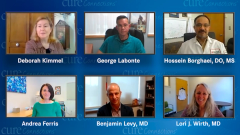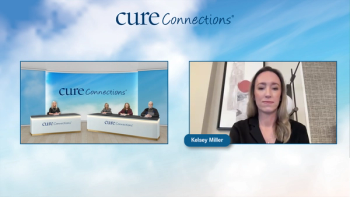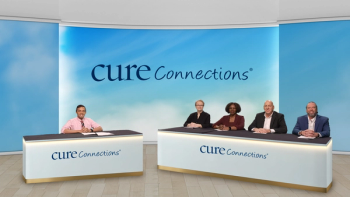
George Labonte: Concerns Upon a Diagnosis of Medullary Thyroid Cancer
George Labonte explains what it was like receiving a diagnosis of medullary thyroid cancer and describes his experience being recommended for biomarker testing and concerns surrounding testing for germline mutations.
Episodes in this series

Hossein Borghaei, DO, MS: I want to go to Mr. Labonte and see how the diagnosis was made for him and what his experience was like.
George Labonte: In early 2016, I was getting ready for work, and I felt something under my Adam’s apple, but it turns out it was an under neck nodule. I didn’t think much of it, but I went to my primary care physician, who ordered some scans and then referred me to an ENT [ear, nose and throat specialist]. The ENT was six weeks out, but he called me two days later and told me he needed to see me right away, which typically isn’t a good sign. Like any other reasonable person, I searched the internet to find out what it could be. I learned that 80% of neck nodules are benign, so I wasn’t too concerned. I went to the appointment, and he did a fine-needle biopsy, which was incredibly painful. Before I left that day he said that, in his experience, this is going to come back as cancer. I remember thinking, “Why would he tell me that? Why make me worry like that if the pathology report hasn’t come back?” In hindsight, if anything, it set me up for this journey. I was at a conference in Seattle, Washington, when he called me and said that he needed to see me right away, which again was not a good sign. I searched the internet on thyroid cancer again and read that 85% of thyroid cancer is papillary and that it’s a very treatable cancer. I went into the appointment expecting him to say that I have papillary thyroid cancer. He said there are four types of thyroid cancer, and I had medullary. I was not prepared for that conversation. This was at a community hospital, and I knew that I wanted to go to [Massachusetts General Hospital in] Boston because its reputation is just fantastic.
I go into Mass General and Dr [Lori] Wirth. I had a germline genetic testing to make sure that It wasn’t familial as well as somatic testing of the tumor. Dr Wirth said at the time there were no RET inhibitors. They were in human clinical trials, so I was very concerned about getting that back. I did want to know about the familial testing, having two siblings, my parents, and also three young children at the time. I was more concerned about that. When I got that call about the germline mutation, I was told it was sporadic. I was so relieved that I didn’t pass anything on to my children. A little while later my tumor marker started bumping up a little, and I had a metastasis in my spine, which put me on the radiation table for some treatments.
I was stable for about another year, and I started having the chronic symptoms of acceleration of this disease. Every appointment, Dr Wirth told me that the RET inhibitors were coming into clinical trials. I remember asking, “Am I a candidate? Am I a candidate yet?” Finally, I ended up being a candidate, and she got me the drugs. I’m so thankful that I had that initial somatic testing. When I learned that the RET inhibitors were coming into clinical trials, although I wasn’t a candidate for it, it was some comfort to know that if my cancer started accelerating, then there was a treatment plan for me.
Hossein Borghaei, DO, MS: That’s great. Have you heard of molecular testing or genomic testing? Have you had anything done or did you know anybody who’s ever gone through testing like that?
George Labonte: No, I didn’t know anything about it. I was fortunate that there’s a Facebook group that just had a patient and caregivers with medullary thyroid cancer. It’s a very informative group. People share their experiences. Someone reached out to me right away when I was diagnosed, and that was a wealth of information. They recommended getting the testing. I was in grad school at the time. I had access to the university library, so I did a lot of research on my own on the different types of genetic testing.
Hossein Borghaei, DO, MS: You didn’t have a patient advocate or a caregiver going with you through these visits. You did a lot of this on your own, basically.
George Labonte: Yeah. My wife has been my rock. She’s been by me every step of the way, but it was me doing the research and advocating for myself.
This transcript has been edited for clarity.


